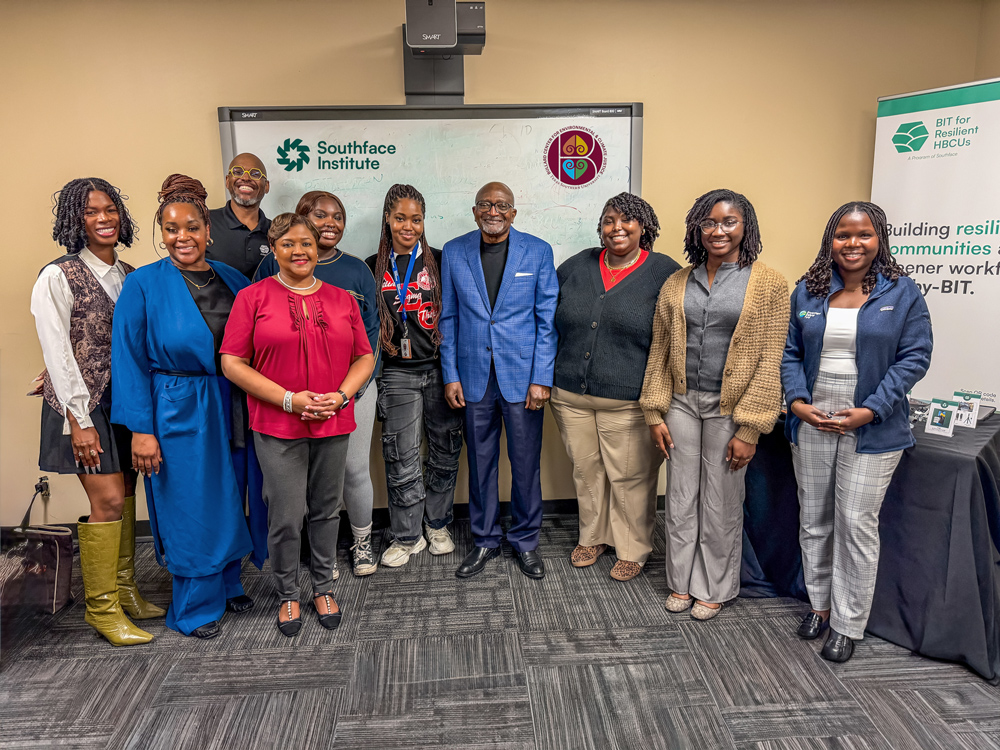Lorem ipsum dolor sit amet, consectetur adipiscing elit. Suspendisse varius enim in eros elementum tristique. Duis cursus, mi quis viverra ornare, eros dolor interdum nulla, ut commodo diam libero vitae erat. Aenean faucibus nibh et justo cursus id rutrum lorem imperdiet. Nunc ut sem vitae risus tristique posuere.
Author: Esther Aina
My fellowship began with an in-person orientation in Washington, D.C., where I built community with my cohort, met the Sustain Our Future Foundation staff, and engaged with policy leaders in the sustainability sector. We toured the Ivy City area with Empower DC, learning about local environmental justice issues, and participated in EJ trainings covering history, community engagement, systemic power, and sustainable development. These sessions reminded me why understanding the history and terminology of EJ is essential for meaningful advocacy.
From weeks two through eight, I interned with Bayou City Waterkeeper in Houston, working alongside their team to advance their mission of protecting water and communities through legal action, community science, and grassroots policy. I joined our Future Fridays virtual sessions with visionary EJ and sustainability leaders every Friday. Topics ranged from water justice and clean energy deployment to recycling, carbon removal, net zero, self-care, and professional development (including using LinkedIn effectively!). This fellowship also provided one-on-one holistic leadership coaching with Chanel Barnes-Osula, helping me identify my core values, align my leadership style with my core values, and grow personally and professionally.
In my first week at BCWK, I started by supporting my supervisor at an Earth Tomorrow Youth Leadership event, where we spoke with high school students about Houston's city budget, including how funds are typically allocated to green spaces, public health, police and fire departments, affordable housing, climate disaster preparedness, resilience planning, and infrastructure like streets, drainage, sewage, and water systems. We discussed how budget priorities can and should better align with Environmental Justice (EJ) and community needs. Afterwards, the students worked in small groups to present alternative city budgets. It was incredible to connect with them and hear their perspectives on how the voices of those most affected by EJ issues should guide critical decisions that impact the entire community.
Afterwards, I was supposed to work with my supervisor to develop a resource hub for Bayou City Waterkeeper, creating presentations, handouts, toolkits, and other materials to support community organizing and education. These resources would cover policy agendas, wetlands and nature-based solutions, clean water, water infrastructure and equity, and language justice.
The director and my supervisor, Danielle, encouraged me to focus on a project that connected my experience at the Bullard Center with my background as a biology student interested in healthcare. While BCWK focuses on sewage justice, water quality, and wetlands through bold legal and community action, they wanted to incorporate a stronger health equity perspective. With Danielle's full support, I researched the intersection of water equity and health equity, exploring how poor water quality disproportionately impacts certain populations including BIPOC communities, children, pregnant women, and the elderly. I examined how historical disinvestment and ongoing environmental racism in Black and Brown neighborhoods have affected water infrastructure and sewage systems, leading these communities to bear the most significant burden from contaminants like sewage, lead, nitrates, chromium-6, arsenic, and disinfection byproducts. Redlining and systemic inequities make these areas more vulnerable to water contamination, flooding, and wastewater overflows. After a month of research, I gave a virtual presentation exploring how health and water equity intersect in the Lower Galveston Bay Watershed.
Including myself, we had about 20 participants (which included my family, friends, church youth group, BCWK staff, and SOFF staff). After the presentation, most people on the call said they didn't know that sewage issues, lead, and other water contaminants are issues that the Houston community is facing, and that it is particularly affecting black, brown, and low-income communities. As a resources intern, I was able to foster community education on the issues that are currently affecting my community. As someone who does not speak a lot, giving this presentation was out of my comfort zone, but through the encouragement and support from my supervisor, Yudith, the entire staff at BCWK, and the professional development sessions provided by Sustain Our Future Foundation, I was able to develop my communication, advocacy, and community engagement skills.
Click the link to view my presentation - View Presentation




